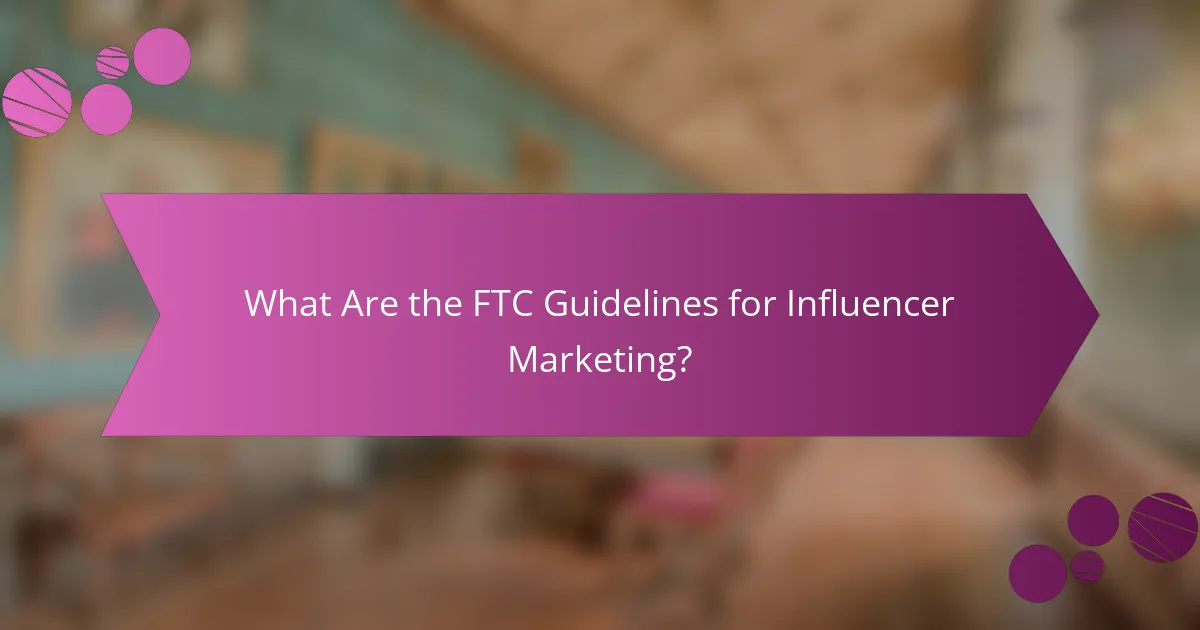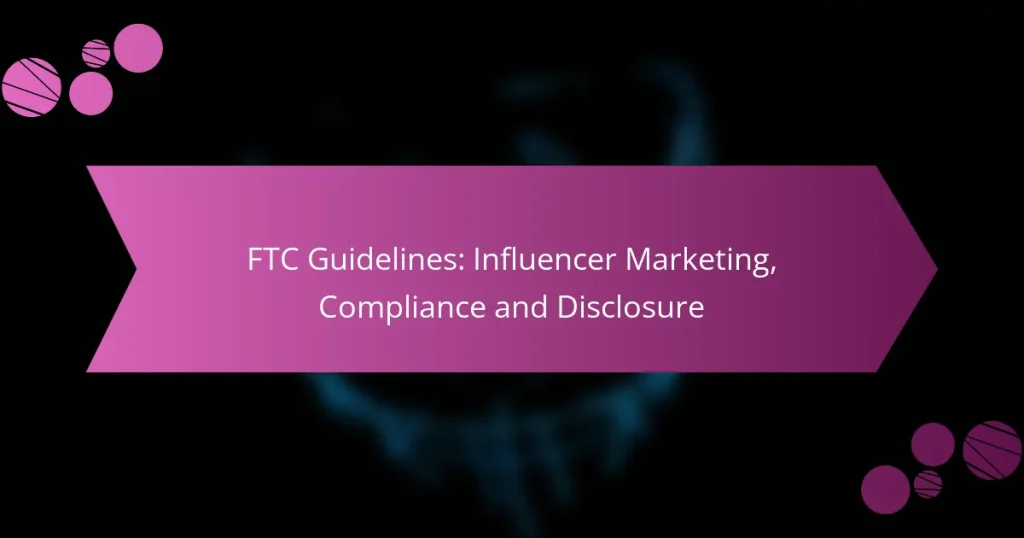The FTC guidelines for influencer marketing are designed to promote transparency and honesty in advertising practices. Influencers are required to disclose their relationships with brands, ensuring that consumers are aware of any potential biases in endorsements. Compliance with these guidelines is crucial, as failure to do so can result in legal penalties and damage to reputations.

What Are the FTC Guidelines for Influencer Marketing?
The FTC guidelines for influencer marketing establish rules for transparency and honesty in advertising. Influencers must disclose their relationships with brands to ensure consumers are aware of any potential biases in endorsements.
Disclosure requirements
Under the FTC guidelines, influencers are required to clearly disclose any material connections with brands, such as payment or free products. This disclosure should be made in a way that is easily noticeable and understandable to the audience, often using terms like “ad” or “sponsored.”
Disclosures must be placed in close proximity to the endorsement, whether in social media posts, videos, or blogs. For example, a simple hashtag like #ad or #sponsored at the beginning of a post is typically sufficient.
Advertising standards
The FTC mandates that all advertising, including influencer marketing, must be truthful and not misleading. Influencers should only make claims about products that they can substantiate, ensuring that any testimonials or endorsements reflect their genuine experiences.
Additionally, influencers should avoid exaggerating the effectiveness of a product or service. Misleading claims can lead to penalties and damage to both the influencer’s and the brand’s reputation.
Examples of compliance
Compliance with FTC guidelines can be demonstrated through various practices. For instance, an influencer reviewing a skincare product should disclose if they received the product for free or were compensated for the review.
Another example is a YouTube influencer who includes a verbal disclosure at the start of their video, stating, “This video is sponsored by XYZ Brand,” along with a written disclosure in the video description. These practices help maintain transparency and build trust with the audience.

How to Ensure Compliance with FTC Guidelines?
To ensure compliance with FTC guidelines, influencers and brands must clearly disclose any material connections in their marketing communications. This means openly stating when content is sponsored or when influencers receive compensation for promoting products.
Best practices for influencers
Influencers should always disclose partnerships in a clear and conspicuous manner. This can be achieved by using hashtags like #ad or #sponsored at the beginning of posts, ensuring that the disclosure is easily visible. Additionally, influencers should avoid vague terms and instead use straightforward language that leaves no room for misinterpretation.
It’s also crucial for influencers to maintain authenticity. They should only promote products they genuinely use and believe in, as this builds trust with their audience and aligns with FTC expectations.
Brand responsibilities
Brands must provide clear guidelines to influencers regarding disclosure practices. This includes educating them on the importance of transparency and ensuring they understand how to properly communicate their relationships with the brand. Brands should also review content before it goes live to ensure compliance with FTC regulations.
Furthermore, brands should keep records of all influencer agreements and communications. This documentation can be vital in demonstrating compliance in case of an FTC inquiry.
Monitoring and enforcement
Regular monitoring of influencer content is essential for brands to ensure ongoing compliance with FTC guidelines. This can involve periodic reviews of social media posts and campaigns to check for proper disclosures. Brands may also consider using tools or services that track influencer activity and flag potential compliance issues.
In terms of enforcement, the FTC has the authority to take action against both influencers and brands that fail to comply with disclosure requirements. Penalties can include fines and mandated corrective actions, making it critical for all parties involved to adhere to the guidelines diligently.

What Are the Consequences of Non-Compliance?
Non-compliance with FTC guidelines in influencer marketing can lead to significant repercussions, including legal penalties and reputational damage. Brands and influencers must understand these consequences to maintain trust and avoid financial losses.
Legal penalties
Legal penalties for non-compliance can vary widely, ranging from fines to more severe sanctions. The FTC can impose fines that may reach thousands of dollars per violation, depending on the severity and frequency of the offense. In some cases, repeated violations can lead to stricter penalties or even legal action.
Additionally, influencers and brands may face lawsuits from consumers or competitors if misleading advertising practices are identified. It’s crucial to ensure that all endorsements are clearly disclosed to avoid these legal repercussions.
Reputational damage
Reputational damage is another serious consequence of failing to comply with FTC guidelines. Brands risk losing consumer trust if they are perceived as dishonest or misleading. This can lead to a decline in sales and a negative public image that may take years to rebuild.
Influencers may also suffer from reputational harm, as followers expect transparency. A tarnished reputation can limit future partnerships and affect an influencer’s overall career in marketing.
Case studies of violations
Several high-profile cases illustrate the consequences of non-compliance with FTC guidelines. For instance, a well-known celebrity faced a hefty fine for failing to disclose a paid partnership in a social media post, highlighting the importance of clear communication in influencer marketing.
Another case involved a brand that was sued by consumers for misleading claims made by influencers who did not disclose their sponsorship. This case resulted in a settlement that not only cost the brand financially but also damaged its reputation in the market.

How to Create Effective Disclosure Statements?
Effective disclosure statements are clear, concise, and easily understandable to the audience. They inform consumers about the nature of the relationship between influencers and brands, ensuring compliance with FTC guidelines.
Clear language guidelines
Disclosures should use straightforward language that the average consumer can easily comprehend. Avoid jargon or complex terms; instead, use phrases like “paid partnership” or “sponsored content” to convey the message clearly.
Using all capital letters or bold text can help emphasize the disclosure, but it should still be integrated naturally into the content. The goal is to ensure that the audience recognizes the promotional nature of the content without confusion.
Placement of disclosures
Disclosures must be placed where they are easily noticeable, ideally at the beginning of the post or video. If the content is long, consider repeating the disclosure at key points to reinforce the message.
On social media platforms, disclosures should be included in the caption or description, not just in the comments. This ensures that viewers see the disclosure before engaging with the content.
Examples of effective disclosures
Examples of effective disclosures include phrases like “This post is sponsored by [Brand Name]” or “I received this product for free in exchange for my honest review.” These statements clearly indicate the nature of the relationship.
Using hashtags such as #ad or #sponsored can also serve as effective disclosures, especially on platforms like Instagram or Twitter. However, ensure these hashtags are placed at the beginning of the post to maximize visibility.
![]()
What Tools Help with Compliance Tracking?
Compliance tracking in influencer marketing is essential for ensuring that promotional content adheres to FTC guidelines. Various tools can streamline this process, helping brands and influencers maintain transparency and accountability.
Influencer marketing platforms
Influencer marketing platforms provide a centralized space for brands to connect with influencers while ensuring compliance with regulations. These platforms often include features that facilitate the tracking of sponsored content, such as automated disclosure reminders and reporting tools.
Examples of popular influencer marketing platforms include AspireIQ, Upfluence, and Influencity. These tools can help brands efficiently manage campaigns and verify that influencers are following disclosure requirements.
Social media monitoring tools
Social media monitoring tools track mentions, hashtags, and engagement metrics across various platforms. They can help brands identify whether influencers are properly disclosing sponsored content in their posts.
Tools like Hootsuite, Brandwatch, and Sprout Social allow brands to set alerts for specific keywords or phrases, ensuring that compliance issues are addressed promptly. Regular monitoring can prevent potential violations and maintain brand integrity.
Analytics for compliance
Analytics tools provide insights into the performance of influencer campaigns while also assessing compliance with disclosure guidelines. These tools can analyze engagement rates, audience demographics, and the visibility of disclosure statements.
Using analytics platforms such as Google Analytics or social media insights, brands can evaluate the effectiveness of their campaigns and ensure that influencers are adhering to FTC standards. Regular reviews of analytics data can help identify trends and areas for improvement in compliance practices.

What Are the Emerging Trends in Influencer Marketing?
Emerging trends in influencer marketing include increased regulatory scrutiny and a shift towards authenticity. These trends are reshaping how brands and influencers interact, emphasizing transparency and genuine connections with audiences.
Increased regulatory scrutiny
Regulatory bodies, such as the Federal Trade Commission (FTC) in the United States, are intensifying their oversight of influencer marketing practices. This scrutiny aims to ensure that influencers disclose paid partnerships and sponsorships clearly to their audiences.
Brands and influencers must stay informed about compliance requirements, as failing to disclose can lead to penalties. Clear labeling, such as using hashtags like #ad or #sponsored, is essential to meet these guidelines and maintain trust with consumers.
Shift towards authenticity
Consumers increasingly favor authentic content over polished advertisements, prompting influencers to showcase genuine experiences and opinions. This trend encourages brands to collaborate with influencers who align closely with their values and target audience.
To leverage this shift, brands should focus on long-term partnerships with influencers rather than one-off campaigns. This approach fosters deeper connections and encourages influencers to create content that resonates more authentically with their followers.


